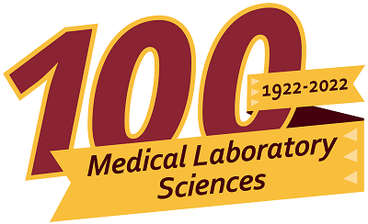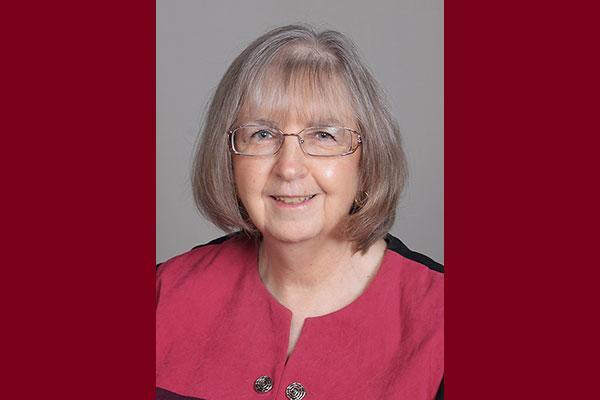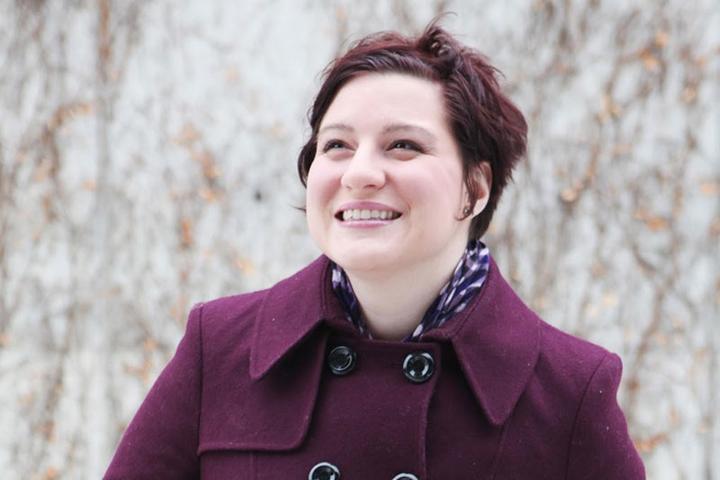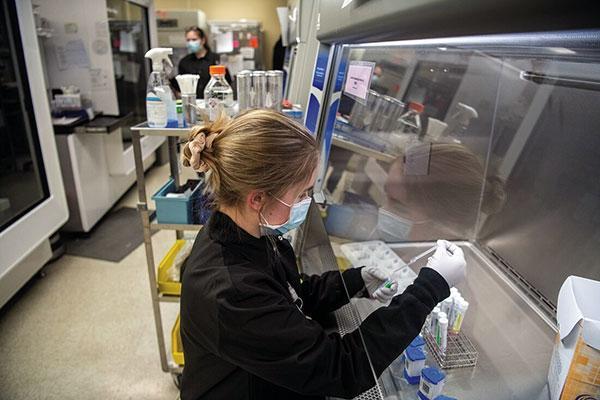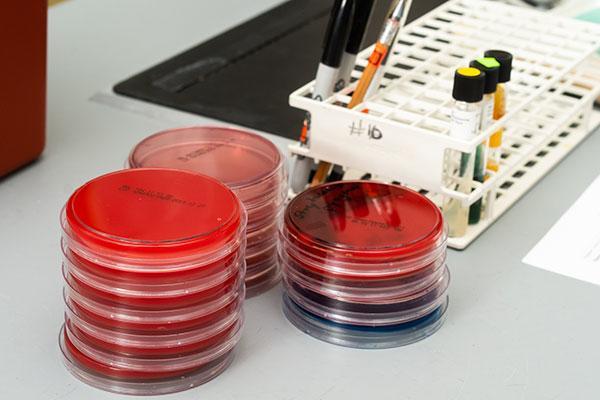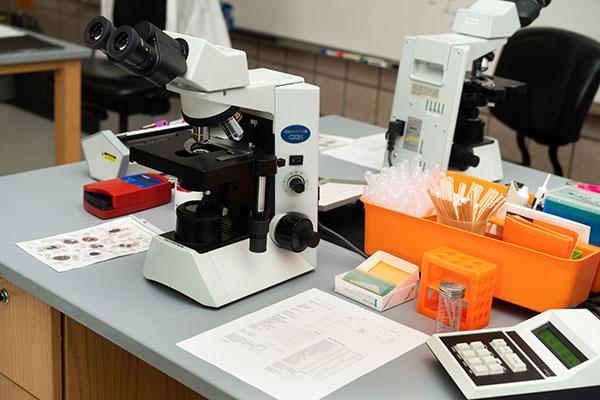The University of Minnesota’s Medical Laboratory Sciences program is the only accredited 4-year baccalaureate degree program in a public institution in the State of Minnesota.
Training MLS Students for Over 100 Years
Our graduates play a crucial role empowering health care teams to diagnose and treat patients and manage their illnesses. Approximately 70% of medical decisions, diagnoses, treatments and evaluations are based on the laboratory interpretive skills which our medical laboratory scientist graduates possess.
MLS Highlights
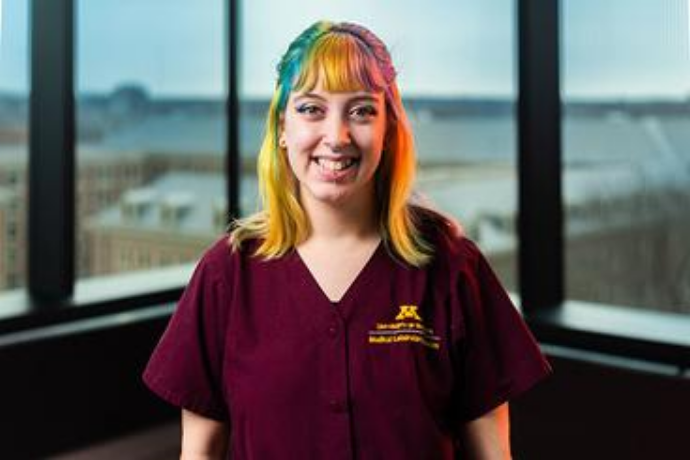
Pathways Scholarship Program
The Medical Laboratory Sciences (MLS) Program is excited to offer the Pathways Scholarship Program to qualified applicants and current students who are accepted into the MLS Program.
With grant funding from the Health Resources and Services Administration (HRSA) to support students from economically disadvantaged, or historically underrepresented/underserved populations, these scholarships make the dream of obtaining a degree in Medical Laboratory Sciences a reality.
UMN MLS Graduates Make Society Healthier – and What They Get Back in Return
Program Mission and Goals
Mission Statement
The mission of the Medical Laboratory Sciences program (MLSP) is one of innovative teaching, research and service to inspire and empower current and future laboratory scientists to be engaged and ethical professionals able to respond and constructively contribute to complex and diverse environments in laboratory medicine.
Our Commitment to Inclusion and Equity
The Medical Laboratory Sciences Program faculty and staff are unequivocally committed to racial justice and equal opportunity. We will continue to work toward removing barriers and systems that impede or limit the access that students of color have so that they may achieve their full potential. We strive to create an effective and encouraging learning environment, where every student experiences a sense of belonging and fulfillment. We pledge to work today and every day in support of the role that education plays in advancing a more just and equitable society.
MLS Program Goals
To fulfill the mission of the Medical Laboratory Sciences Program and University as well as meet the needs of the medical laboratory community, the Medical Laboratory Sciences Program will:
- Use innovative educational methods to deliver an exceptional curriculum which best suits the needs of a diverse population
- Facilitate transfer of knowledge and skills to adapt to a current and evolving scope of practice
- Foster an environment which develops crucial thinking, clinical reasoning, and creative problem solving
- Develop and investigate innovative educational methods to contribute to best practices in laboratory science education
- Collaborate with internal and external partners to achieve the research needs of the profession
- Disseminate relevant materials to professional colleagues and community stakeholders through research and scholarly inquiry
- Promote the profession through innovative education and engagement
- Collaborate with other healthcare professionals to serve the needs of a diverse population
- Cultivate the environment of active participation in professional organizations
- Model professional, ethical practice, and leadership
MLS Program Student Outcome Goals
After completion of the MLS professional curriculum (BS and Certificate), the student should:
- Master the Medical Laboratory Science Entry Level Curriculum and mode of inquiry appropriate for graduates entering the profession, including interpretation, performance, and application of laboratory testing
- Identify and critically evaluate information and develop a plan toward problem resolution
- Actively participate in partnerships that enrich patient and community health
- Communicate laboratory information effectively to a variety of audiences
- Continue personal and professional development
- Understand, value, and practice ethical principles, moral reasoning, and professional responsibilities
- Value and practice skills for continuous improvement through critical self-appraisal and openness to feedback
- Make decisions in the absence of complete information while functioning independently and professionally in a complex environment
- Apply the skills acquired in the MLS program for effective leadership and advocacy within and for the profession
- Positively contribute to a productive and professional environment
Career Competencies
Because laboratory practitioners are essential members of the health care team, there are competencies required of professional program graduates. Graduates of the MLS program should be ready to become active functional members at the levels prescribed for those entering the profession. Graduates should continue to meet the Technical Standards (Essential Functions) required while in the academic program while continuing to evolve into an experienced practitioner. The following descriptive levels are used to rate the career entry level competencies and therefore competencies that must be achieved by graduation for a MLS practitioner.
Entry Level Competencies of the Medical Laboratory Scientist (NAACLS)
At entry level, the medical laboratory scientist will possess the entry level competencies necessary to perform the full range of clinical laboratory tests in areas such as Clinical Chemistry, Hematology/Hemostasis, Immunology, Immunohematology/Transfusion medicine, Microbiology, Urine and Body Fluid Analysis and Laboratory Operations, and other emerging diagnostics, and will play a role in the development and evaluation of test systems and interpretive algorithms. The medical laboratory scientist will have diverse responsibilities in areas of analysis and clinical decision making, regulatory compliance with applicable regulations, education, and quality assurance/performance improvement wherever laboratory testing is researched, developed or performed.
At entry level, the medical laboratory scientist will have the following basic knowledge and skills in:
- Application of safety and governmental regulations and standards as applied to medical laboratory science;
- Principles and practices of professional conduct and the significance of continuing professional development;
- Communications sufficient to serve the needs of patients, the public and members of the health care team;
- Principles and practices of administration and supervision as applied to medical laboratory science;
- Educational methodologies and terminology sufficient to train/educate users and providers of laboratory services;
- Principles and practices of clinical study design, implementation and dissemination of results.
Writing Enriched Curriculum (WEC) Outcome Goals
In 2013 the Medical Laboratory Science Program began an ongoing program to implement and sustain improvement in undergraduate writing. This initiative acknowledges that writing abilities are an essential communication skill for entry into the workforce as well as graduate or other professional schools. For that reason each course will assess the students’ ability to convey information through writing to a variety of audiences as an indicator that the student has mastered the required course content.
Writing abilities of MLS graduates:
- Understand and use standard English, structure, and organization
- Use language effectively in a concise and comprehensible manner
- Communicate in different mediums appropriate to the content, delivery mechanisms, and audience
- Record and document information accurately and in the appropriate format
- Access, select, critically evaluate and convey information
- Engage in self-evaluation of writing skills
- Write with honesty, integrity, originality, and contextual sensitivity
NAACLS Accreditation and Outcomes
Accreditation

The University of Minnesota Medical Laboratory Science program is proud to be fully accredited by the:
National Accrediting Agency for Clinical Laboratory Sciences
NAACLS
5600 N. River Rd, Suite 720
Rosemont, IL 60018-5119
Phone: 847-939-3597 or 773-714-8880
NAACLS Web Site
Email
NAACLS accreditation assures that the MLS program at the University of Minnesota has met or exceeded specific national Standards developed through a process that requires the input and review of peer groups, sponsoring and participating organizations, affiliating organizations and other interested professional groups. The most recent self-study and site visit inspection of the MLS program was completed in 2021 during which time the MLS Program was given a full 10-year renewal by NAACLS. The next self-study review and site visit for accreditation renewal should occur in 2030-2031.
The MLS program delivers the curriculum on the Twin Cities campus of the University of Minnesota and also offers certification to students entering through the following affiliated universities: St. Cloud State University, Mankato State University, as well as University of Wisconsin-River Falls.
Dr. Donna Spannaus-Martin serves as the Program Director and Diane Hutchinson serves as the Clinical Coordinator.
Program Outcomes
NAACLS accredited programs must demonstrate the quality of their educational plan by meeting certain minimum student performance outcomes including student graduation (program completion) rates; performance on the American Society of Clinical Pathology (ASCP) Board of Certification (BOC) Exam; and ability to obtain employment. Our MLS program has consistently exceeded these minimum requirements.
| Class of 2020 | Class of 2021 | Class of 2022 | Class of 2023 | |
|---|---|---|---|---|
| Graduation Rate1 | 97% | 87% | 80% | 100% |
| ASCP/BOC Pass Rate2 (National Mean = 80%) | 95% | 96% | 100% | 89%* |
| Employment Placement3 | 100% | 95% | 100% | 100%* |
1 Percentage of students who enter professional year (year 4) of the program that graduate on time.
2 Percentage of students who pass the national certification exam within the first year after graduation.
3 Percentage of graduates who succeed in finding employment or who successfully apply to professional or graduate school within 6 months of graduation.
* = final results pending
